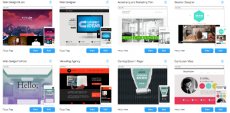 Creativity and artistic vision are obvious traits of great any great web designer, but beautiful imagery alone will not guarantee that your design business become a success. Understanding marketing techniques is as vital to web designers as it is for every small biz owner.
Creativity and artistic vision are obvious traits of great any great web designer, but beautiful imagery alone will not guarantee that your design business become a success. Understanding marketing techniques is as vital to web designers as it is for every small biz owner.
Web designers have a solid head start when it comes to marketing. They often work with marketing briefs on projects that prioritize branding and online promotion. Yet when it comes to promoting their own brand – their design skills – this prior experience doesn’t always manifest itself to great marketing for personal design work.
To make things more simple for self-employed professionals, we prepared a quick list of steps that can take to help boost a budding web design business.
1. Set Up a Dream Online Portfolio:
 Show off your skills and experience with an online portfolio. A great online portfolio should capture your reader’s attention with a gorgeous design and then lure them further to look at your previous works. Being the great designer that you are, your portfolio is the perfect place to profile your work in practical framework, and serve as the “hook” that gets potential clients interested. Digging deeper into your web page, your previous work will only further amplify that you’re the right designer for them.
Show off your skills and experience with an online portfolio. A great online portfolio should capture your reader’s attention with a gorgeous design and then lure them further to look at your previous works. Being the great designer that you are, your portfolio is the perfect place to profile your work in practical framework, and serve as the “hook” that gets potential clients interested. Digging deeper into your web page, your previous work will only further amplify that you’re the right designer for them.
2. Keep it Versatile:
Your first priority is to display your best possible works, but you also want your portfolio to demonstrate your wide range of styles and genres. If you only show works you have done for musicians, for instance, you immediately brand yourself as a niche designer. This might have an advantage later on, but especially young designers should try to open as many opportunities as possible.
3. Work the Social Media:
This looks like an obvious move, sure, but web designers have a real challenge with social media because they are not promoting anything tangible nor standalone works of art. The big task, therefore, is to come up with creative social marketing methods. Wix, as a company that promotes DIY web design, faces this challenge as well. Check out our Instagram and Pinterest account to see how we take on this challenge in an innovative way.
The big task, therefore, is to come up with creative social marketing methods. Wix, as a company that promotes DIY web design, faces this challenge as well. Check out our Instagram and Pinterest account to see how we take on this challenge in an innovative way.
4. Use Testimonials:
Collect endorsements and customer reviews and display them neatly in one section of your website, along with links and pics of the relevant work you did for each client. This will generate trust and familiarity that is so crucial for potential customers.
5. Guest Blog:
Your knowledge and experience make you an authority in a field that interests hundreds of thousands of people from all over the world. If you can author original blog posts and suggest them as free content to major web design blogs in exchange for a link to your online portfolio, it will both mark you as a credible professional, and it will help improve your ranking on search engines results.
If you can author original blog posts and suggest them as free content to major web design blogs in exchange for a link to your online portfolio, it will both mark you as a credible professional, and it will help improve your ranking on search engines results.
6. Work Pro Bono:
A great way to get your name out there is to volunteer your skills for a cause you support and design web content pro bono for an organization. Not only is it a great thing for karma, you also get credit for the designs that you created AND another piece to go into your portfolio.
7. Be Offline:
Try to get involved with offline speaking opportunities, conferences, workshops, meetups and other types of face-to-face communications that can put your face and your name out there in people’s minds. The Wix Lounge in New York and in San Francisco offer tons of opportunities for such events. Bring your business cards!
8. Stay Personal:
If you want to raise the chances that your previous clients will recommend you to their friends and colleagues, give them the feeling that you care about them even after you completed your work for them. You can offer them feedback on their work, you can help promote them on your social media channels, you can even do something as simple as emailing holiday greetings – anything that can show them that you’re devoted and friendly.
9. Seek Valuable Partnerships:
Time to put your networking skills to the test and find options for ongoing and meaningful co-operations. For web designers, the obvious partners would be developers, branding and PR firms or talent representation agencies. Setting up an agreement with a business like that will guarantee a stream of incoming projects and provide you with a great safety net.













